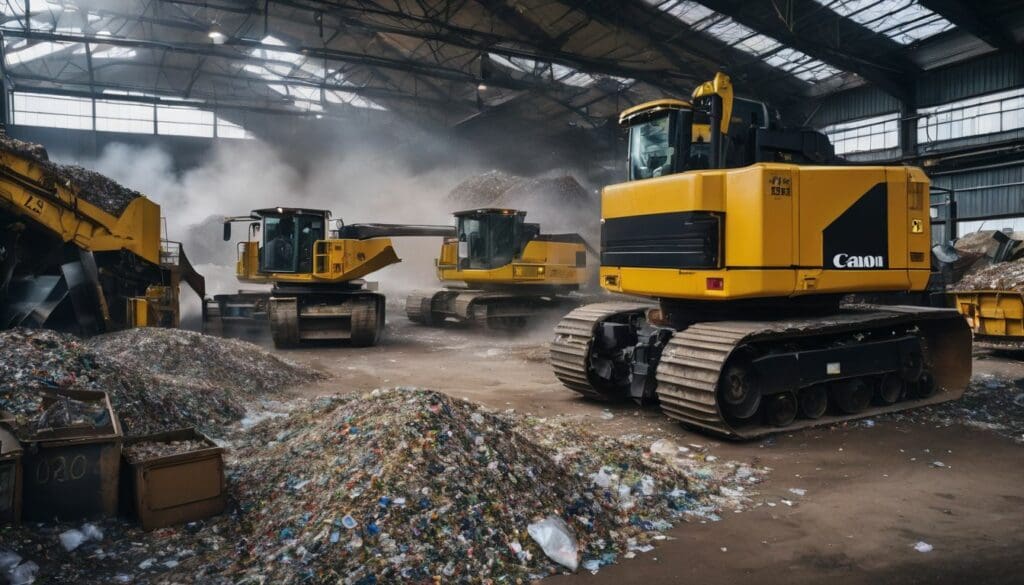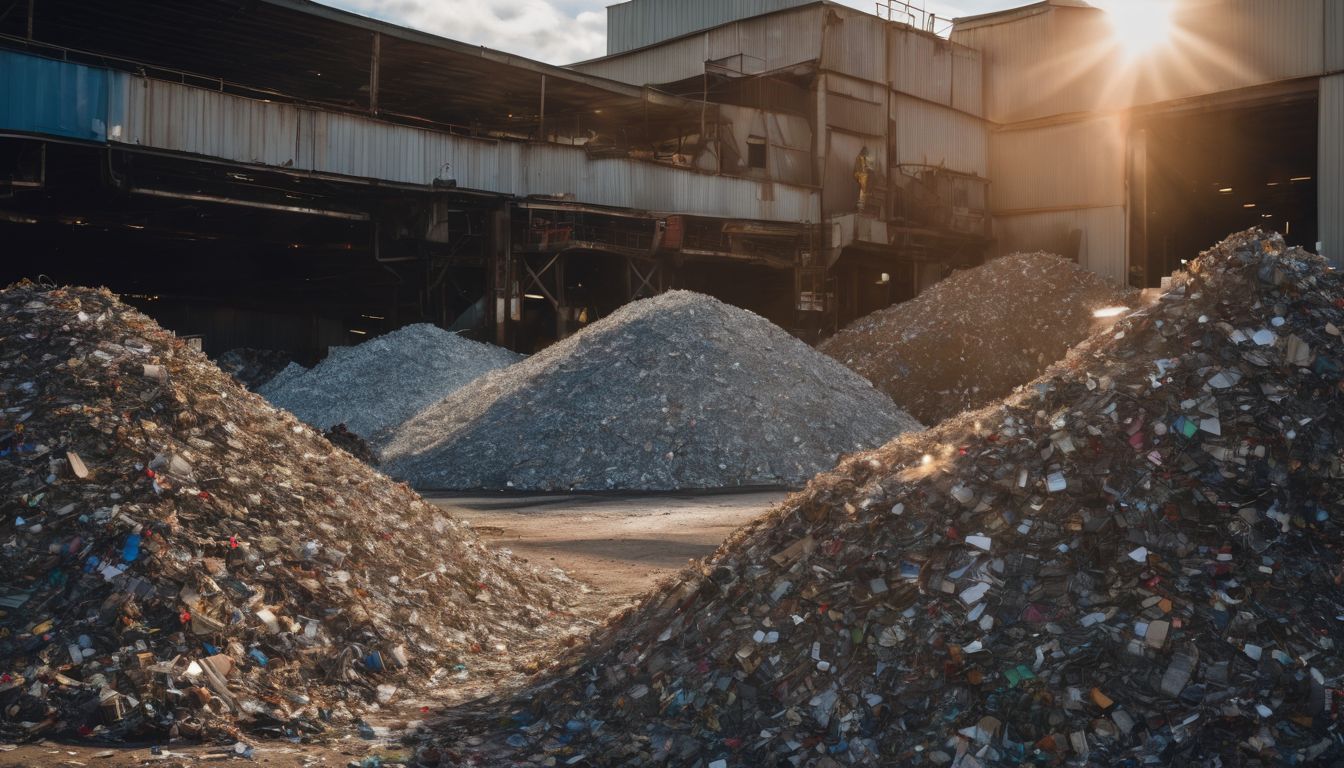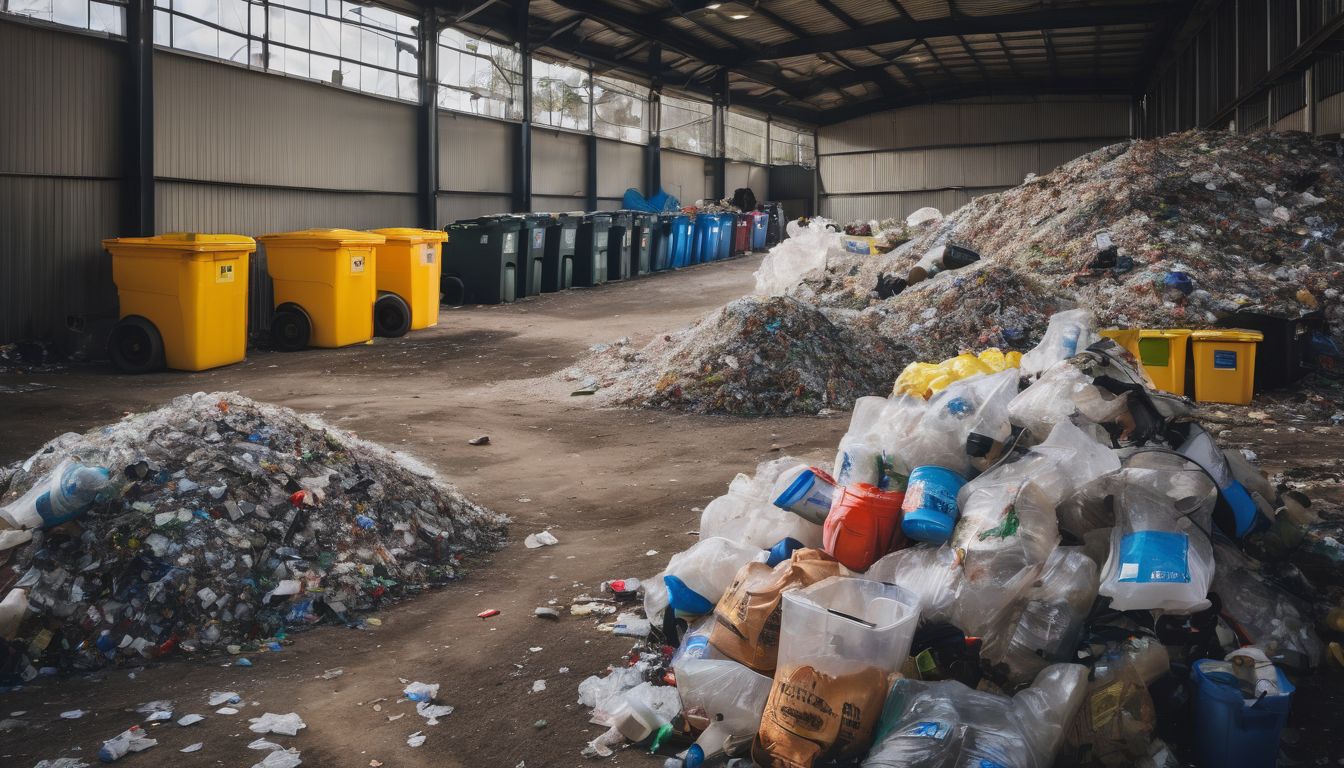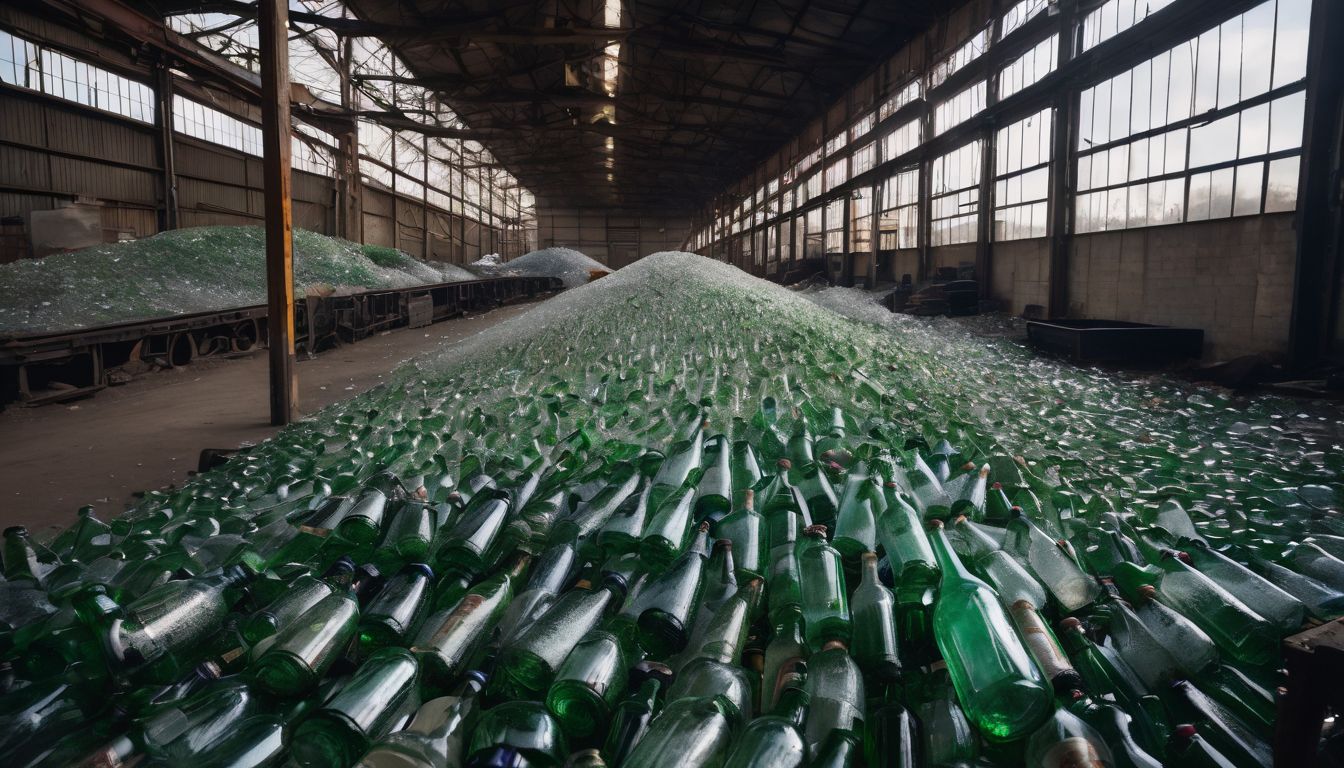Recycling seems simple, but its true cost and benefits often leave many of us puzzled. Every year, we generate around 2.01 billion tonnes of waste globally, much of which could be recycled.
Our blog will unravel the economics behind recycling, guiding you to make informed choices and understand its impact on our planet. Discover why turning trash to treasure matters for your wallet and the world!
Key Takeaways
- Recycling conserves energy and natural resources such as water, trees, fossil fuels, and metal ores.
- Activities involved in recycling create jobs within waste management and sustainable manufacturing sectors.
- Utilising recycled materials can lower business production costs by avoiding the expense of raw material extraction.
- Despite its importance for environmental conservation, recycling processes can be costly due to sorting and processing needs.
- The growing demand for recycled materials indicates their value in supporting a sustainable and circular economy.
Environmental Benefits of Recycling
Recycling conserves natural resources, reduces pollution and greenhouse gases, lowers landfill waste, and also conserves energy. These benefits have a direct impact on the environment and contribute to a more sustainable future.
Conserves natural resources
Every time we recycle, we help preserve our planet’s precious resources. Materials like paper, plastics, and metals can be remade into new products without depleting more of the earth’s reserves.
By reusing these items, trees are saved from being cut down for paper, fossil fuels remain underground instead of being used for plastic production, and metal ores stay in the ground rather than getting mined.
This sustainable approach helps maintain biodiversity and keeps ecosystems intact.
Choosing to recycle directly impacts water conservation as well. The manufacturing process for goods often demands a large amount of water; when we recycle materials already in circulation, it drastically cuts down on water usage.
Sustainable practices like recycling ensure that future generations have access to not just clean air and soil but also the fresh water they’ll desperately need.
Reduces pollution and greenhouse gases
Recycling helps reduce pollution and greenhouse gases by limiting the need for new raw materials, thus cutting down on industrial processes that release harmful emissions. Salvaging used materials lessens the demand for energy-intensive manufacturing and reduces air and water pollution associated with extraction, processing, and transportation of virgin resources.
By actively participating in recycling efforts to reuse paper, glass, plastic, aluminium, or other materials instead of creating entirely new products from scratch, individuals directly contribute to lowering their carbon footprint alongside combatting climate change.
Understanding how recycling tackles pollution and greenhouse gases is crucial for supporting a sustainable future. The next section explores economic benefits linked to recycling actions.
Reduces landfill waste
Recycling reduces the amount of waste sent to landfills, helping to manage and alleviate environmental problems. It lessens the burden on landfill space, reducing the need for new landfills and curbing soil, air, and water pollution from waste disposal sites.
Additionally, by diverting materials from landfills, recycling extends the lifespan of existing landfill sites and supports sustainable waste management practices.
By reducing reliance on landfills through recycling efforts, we can actively contribute towards a cleaner environment while conserving valuable resources.
Conserves energy
Recycling conserves energy, reducing the need for raw material extraction and production from scratch. The process of manufacturing products from recycled materials typically uses less energy than creating new items, contributing to a more sustainable and efficient use of resources.
By recycling aluminium, plastic, paper, and glass, we conserve energy that would otherwise be expended in mining, refining, and processing virgin materials. This reduction in energy consumption helps mitigate climate change by lowering greenhouse gas emissions associated with resource extraction and production.
Economic Benefits of Recycling
Recycling creates better jobs, lowers production costs, and supports economic justice. Read on to learn more about the economics of recycling and its impact on the environment.
Creates better jobs
Recycling creates better jobs by stimulating the demand for workers in waste management, recycling facilities, and sustainable product manufacturing. As more materials are diverted from landfills, new opportunities emerge for individuals skilled in material sorting, processing, and remanufacturing.
Moreover, the development of a circular economy encourages job growth in sectors that value resource efficiency and environmental sustainability.
By supporting the recycling industry through our actions and consumer choices, we contribute to job creation while promoting economic and environmental benefits for our communities.
Lowers production costs
Recycling lowers production costs by reducing the need for raw materials, which can be expensive to extract and process. The use of recycled materials also reduces energy consumption during manufacturing, leading to lower overall production costs.
This cost reduction can make businesses more competitive in the market while contributing to a more sustainable and efficient economy.
Leveraging recycled materials not only cuts down on expenses but also minimises the environmental impact associated with resource extraction and processing. By incorporating recycled content into products, companies can improve their bottom line while playing a vital role in conserving natural resources and mitigating pollution.
Supports economic justice
By reducing production costs, recycling supports economic justice by creating better jobs and lowering the overall environmental impact caused by traditional manufacturing. This process fosters a more sustainable and equitable economy while promoting resource conservation and waste reduction.
Additionally, recycling contributes to the development of a green economy, which emphasises environmentally responsible practices that benefit both people and the planet. These economic benefits make recycling an integral part of achieving economic justice and environmental sustainability.
Moreover, emphasising recycled materials over virgin resources encourages reusing items, thereby reducing energy consumption, pollution levels, and reliance on natural resources. This approach aligns with the principles of environmental stewardship and economic equity, supporting communities in building a more environmentally conscious society.
What Can and Should Be Recycled?
Aluminum, plastic, paper, and glass are just a few examples of materials that can and should be recycled. Proper recycling of these items can help conserve natural resources and reduce landfill waste.
Aluminum
Aluminum recycling is essential in conserving natural resources and reducing energy consumption. By recycling aluminum, we can lower production costs, which contributes to economic justice and supports the creation of better jobs.
Additionally, reusing aluminum helps mitigate climate change by reducing greenhouse gas emissions. This metal plays a crucial role in promoting energy conservation and pollution reduction through its efficient recycling process.
Recycling aluminum is an integral part of sustainable living as it significantly reduces water and air pollution while also contributing to overall environmental preservation efforts.
Plastic
Plastic plays a significant role in our lives, but its disposal presents a major environmental challenge. Recycling plastic is crucial for conserving natural resources and reducing pollution.
It also contributes to energy efficiency by reusing materials and mitigating climate change. Economically, recycling plastic lowers production costs and supports the demand for recycled materials, making it an essential part of the circular economy.
As environmentally conscious individuals, supporting conservation and the environment through recycling plastic can make a real difference.
Paper
Moving on from plastic, another widely recycled material is paper. Recycling paper helps to significantly reduce the amount of waste that ends up in landfills and also conserves natural resources.
By recycling paper, we can save trees from being cut down and contribute towards a more sustainable environment. The economic benefits of recycling paper are evident through lower production costs and the creation of green jobs in the industry.
Recycling paper not only reduces pollution but also supports economic justice as it creates opportunities for individuals within the community. Additionally, government initiatives supporting recycling incentives play a crucial role in promoting the economic benefits of recycling paper.
Glass
Glass is a recyclable material that has significant environmental and economic benefits. Recycling glass reduces the demand for raw materials, conserves energy, and minimises landfill waste.
Additionally, recycling glass helps to lower production costs and supports economic justice by creating better jobs within the recycling industry.
Recycling glass also contributes to climate change mitigation by reducing greenhouse gas emissions. By choosing to recycle glass products, environmentally conscious individuals can play a crucial role in supporting conservation efforts and promoting sustainable resource management.
The Cost of Recycling
Recycling can be expensive due to the need for sorting, transportation, and processing of materials. To learn more about the costs and benefits of recycling, keep reading.
Why is recycling expensive?
Recycling is expensive due to the costs associated with collection, sorting, and processing of materials. Additionally, market fluctuations and low demand for certain recycled materials can drive up the overall cost of recycling.
The transportation of recyclables to processing facilities also adds to the expense. Furthermore, stringent quality requirements for recycled materials increase the expenses involved in recycling processes.
The high cost of recycling underscores the need for increased public awareness about proper recycling practices and creating a demand for recycled products, which could help lower costs by making it more economically viable.
Is recycling worth it?
Recycling is worth it as it reduces pollution and conserves natural resources. It lowers production costs, creates better jobs, and supports economic justice. Examining the costs and benefits shows that recycling has a positive impact on the economy.
The demand for recycled materials continues to grow, indicating its value in sustaining a circular economy.
Moving forward, understanding the connection between recycling and the economy is crucial. Government initiatives are essential in providing support, but individual efforts also make a significant difference.
By reducing waste and actively participating in recycling efforts, we contribute to a more sustainable future for our planet.
Examining the costs and benefits
Weighing up the economic implications and environmental impacts reveals the true value of recycling.
| Aspect | Costs | Benefits |
|---|---|---|
| Collection and Sorting | Requires significant investment in infrastructure and labour. | Ensures materials are ready for reprocessing, reducing contamination. |
| Processing | Energy-intensive procedures can be costly. | Recycled materials often require less energy to produce than virgin materials. |
| Market Demand | Fluctuating prices for recycled materials can deter investment. | Stable demand creates a steady stream of revenue and incentives to recycle. |
| Environmental Impact | Some emissions are generated during recycling. | Saves precious resources and significantly cuts greenhouse emissions. |
| Landfill Space | Diverting waste from landfills may result in short-term costs. | Long-term savings from extended landfill lifespans. |
| Job Creation | Higher initial costs for training and employing skilled workers. | Generates more jobs compared to waste disposal industries. |
The demand for recycled materials is a critical factor that shapes the economics of recycling.
The demand for recycled materials
The demand for recycled materials continues to rise as more businesses and consumers prioritise sustainable practices. Industries such as packaging, construction, and technology are actively seeking out recycled materials to meet their production needs.
This trend is driven by the growing awareness of environmental impact and the economic benefits of using recycled resources. As a result, there is an increasing need for efficient recycling processes that can consistently provide high-quality materials to meet this demand.
Recycled materials are increasingly being sought after due to their lower environmental footprint, reduced energy requirements in manufacturing, and potential cost savings. The market demand for these materials plays a crucial role in driving investment in advanced recycling technologies and infrastructure.
The Path Forward for Recycling
The connection between recycling and the economy is crucial for sustainable development. Government initiatives and support are essential in driving recycling efforts, along with the importance of reducing waste through individual actions.
The connection between recycling and the economy
Recycling plays a pivotal role in the economy, contributing to job creation, resource efficiency, and reduced production costs. By recycling materials like aluminium, plastic, paper, and glass at a large scale, it helps to reduce the demand for raw materials and energy consumption.
This not only conserves natural resources but also lowers overall production costs for manufacturers while creating employment opportunities through processing and reusing these materials.
The economic impact of recycling extends beyond cost savings. It supports economic justice by providing equitable job opportunities across various sectors of society. Additionally, government initiatives aimed at promoting recycling further reinforce its significant contribution to the economy by stimulating market demand for recycled goods and fostering innovation in waste management technologies.
Government initiatives and support
Government initiatives and support play a crucial role in promoting recycling and sustainability:
- Establishing policies and regulations that encourage recycling practices.
- Providing funding for research and development of innovative recycling technologies.
- Implementing education and awareness campaigns to promote the benefits of recycling.
- Offering incentives, such as tax breaks or subsidies, to businesses and individuals who engage in recycling activities.
- Collaborating with industry stakeholders to develop efficient collection and processing systems for recycled materials.
- Supporting the development of infrastructure for recycling facilities and programs.
The importance of reducing waste
Government initiatives and support have played a crucial role in promoting recycling and waste reduction. Understanding the importance of reducing waste can help us contribute to a more sustainable future.
By minimising our wastage, we conserve valuable resources, reduce pollution, and lower landfill needs. Embracing practices such as reusing items, reducing unnecessary packaging, and recycling materials can significantly impact our environment for the better.
Furthermore, reducing waste not only benefits the environment but also supports economic growth by lowering production costs and creating new opportunities within the recycling industry.
How you can make a difference
You can make a difference by:
- Separating recyclables from regular waste and placing them in designated bins.
- Supporting local recycling programs and advocating for improved waste management policies.
- Educating yourself about what materials can be recycled in your area, and following the guidelines accordingly.
- Encouraging friends, family, and colleagues to recycle and reduce their environmental footprint.
- Investing in reusable products and reducing single-use items to cut down on waste.
Conclusion
In conclusion, the economics of recycling offers numerous benefits for both the environment and the economy. Recycling conserves natural resources, reduces pollution, and supports economic justice.
It also creates better jobs, lowers production costs, and contributes to energy conservation. By understanding the costs and benefits of recycling, we can take meaningful steps towards building a sustainable future for our planet.
Making small changes in our daily lives can collectively make a significant impact on preserving our environment for future generations.
FAQs
1. What is cost-benefit analysis in recycling economics?
Cost-benefit analysis in recycling economics weighs the financial pros and cons of recycling to understand if the benefits outweigh the expenses.
2. How does life cycle analysis help with understanding recycling costs?
Life cycle analysis helps by looking at a product’s entire journey from creation to disposal, showing us both the economic impacts and environmental effects of recycling it.
3. Can recycling actually save money for people and businesses?
Yes, while there might be upfront costs, over time, businesses and consumers can often save money thanks to reduced waste disposal fees and potential income from recyclable materials.
4. Are there long-term economic benefits of implementing wide-scale recycling programs?
Certainly! Wide-scale recycling programs may involve initial investments but they can lead to substantial savings on raw materials, energy consumption, and landfill use over time.





